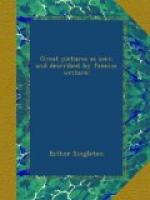All the fascinations of a woman in repose: languor, idleness, abandon, leaning back, reclining at full length, nonchalance, the cadences of pose, the pretty air of profiles bending over the scales of love (gammes d’amour), the receding curves of the bosom, the serpentine lines and undulations, the suppleness of the female body, the play of slender fingers on the handle of a fan and the indiscretions of high heels beyond the skirts, and the happy fortune of deportment, and the coquetry of actions, and the management of the shoulders, and all that knowledge that was taught to women by the mirrors of the last century,—the mimicry of grace!—lives in Watteau with its blossom and its accent, immortal and fixed in a more vital proof than the bosom of the wife of Diomedes moulded by the ashes of Pompeii. And if this grace is animated by Watteau, if he looses it from repose and immobility, if he renders it active and moving, it seems that it works with a rhythm and that its measured pace is a dance led by some harmony.
How decorative is the form of woman, and her grace! O nature, wherein the painter’s poetic fancies wander! O landscape! O stage fit for a desirable life! a helpful land, gallant woods, meadows full of music, groves propitious to the sports of Echo! cradling trees hung with baskets of flowers! desert places far from the jealous world, touched by the magic brush of a Servandoni, refreshed with fountains, peopled with marbles and statues, and Naiads, that spot the trembling shadow of the leaves! jets of water suddenly springing up in the midst of farm-yards! an amiable and radiant countryside! Suns of apotheosis, beautiful lights sleeping on the lawns, penetrating and translucent verdure without one shadow where the palette of Veronese, the riot of purple, and of blonde tresses may find sleep. Rural delights! murmurous and gorgeous decorations! gardens thick with brier and rose! French landscapes planted with Italian pines! villages gay with weddings and carriages, ceremonies, toilettes, and fetes stunned with the noise of violins and flutes leading the bridal of Nature and the Opera to a Jesuit fane! Rustic scene on the green curtain, on the flowery slope up which the Comedie Francaise climbs and the Comedie Italienne gambols.
Quick! to array the spring in ball costume, Watteau’s heavens and earth, quick. Gelosi! A bergomask laugh shall be the laughter, animation, and action, and movement of the piece. Look where Folly, capped and belled, runs and wakes gaiety, zephyrs, and noise! Ruffs and caps, belts and daggers, little vests and short mantles, go and come. The band of buffoons comes running, bringing beneath the shady boughs the carnival of human passions and its rainbow-hued garb. Variegated family, clothed with sunlight and brilliant silk! that masks with the night! that patches and paints with the moon! Harlequin, as graceful as a product of the pencil of Parmesan! Pierrot, with his arms at his side, as straight as an I, and the Tartaglias, and the Scapins, and the Cassandras, and the Doctors, and the favourite Mezzetin “the big brown man with the laughing face” always in the foreground with his cap on the back of his head—striped all over like a zebra, proud as a god, and drunk as a Silenus! It is the Comedie Italienne that plays the guitar in all these landscapes....




